|
|
|
Sort Order |
|
|
|
Items / Page
|
|
|
|
|
|
|
| Srl | Item |
| 1 |
ID:
140965
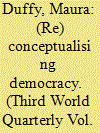

|
|
|
|
|
| Summary/Abstract |
The 21st century has witnessed increasing dissatisfaction with existing democratic institutions and processes and the growth of alternatives to representative democracy. At the same time arguments are emerging that conventional standards for evaluating democracy are ‘out of touch’ with current realities; in particular, with popular understandings, experiences and aspirations of what democracy should look like. This paper draws on empirical research in Caracas, Venezuela into how Venezuelan people understand democracy, in order to build a case that current evaluatory benchmarks are inadequate for understanding complex processes of social change based on more direct and participatory forms of democratic engagement.
|
|
|
|
|
|
|
|
|
|
|
|
|
|
|
|
| 2 |
ID:
112492
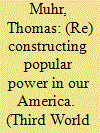

|
|
|
|
|
| Publication |
2012.
|
| Summary/Abstract |
With Nicaragua's Sandinista People's Revolution (1979-90) as an ideological reference point, this paper adopts an historical approach to a theorisation of the contemporary (re)construction of popular power in Latin America and the Caribbean through the Bolivarian Alliance for the Peoples of Our America-Peoples' Trade Agreement (alba-tcp). At the core of the analysis is the Venezuelan government's concept of 'protagonistic revolutionary democracy' which, by drawing on Marxist direct democracy and CB Macpherson's participatory democracy, can be understood as the definitional foundation of the envisioned '21st century socialism'. Mechanisms for the exercise of direct democracy and of participatory democracy promotion are identified at the national and regional scales, through which the alba-tcp emerges as a counter-hegemonic governance regime composed of two dialectically interrelated forces: the 'state-in-revolution' and the 'organised society'. They drive the regionalisation of 'revolutionary democracy', thus (re)constructing popular power in the production of the alba-tcp space.
|
|
|
|
|
|
|
|
|
|
|
|
|
|
|
|
| 3 |
ID:
080850
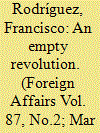

|
|
|
|
|
| Publication |
2008.
|
| Summary/Abstract |
Even critics of Hugo Chávez tend to concede that he has made helping the poor his top priority. But in fact, Chávez's government has not done any more to fight poverty than past Venezuelan governments, and his much-heralded social programs have had little effect. A close look at the evidence reveals just how much Chávez's "revolution" has hurt Venezuela's economy -- and that the poor are hurting most of all
|
|
|
|
|
|
|
|
|
|
|
|
|
|
|
|
| 4 |
ID:
183776


|
|
|
|
|
| Summary/Abstract |
Foundational theories of trade politics emphasize a conflict between consumer welfare and protectionist lobbies. But these theories ignore other powerful lobbies that also shape trade policy. We propose a theory of trade distortion arising from conflict between consumer welfare and importer lobbies. We estimate the key parameter of the model—the government's weight on welfare—using original data from Venezuela, where Hugo Chávez used an exchange-rate subsidy to underwrite hundreds of billions of dollars of imports. Whereas estimates from traditional models would make Chávez look like a welfare maximizer, our results indicate that he implemented distortionary commercial policy to the benefit of special interests. Our analysis underscores the importance of tailoring workhorse models to account for differences in interest group configuration. The politics of trade policy is not reducible to the politics of protectionism.
|
|
|
|
|
|
|
|
|
|
|
|
|
|
|
|
| 5 |
ID:
076722
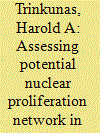

|
|
|
|
|
| Publication |
2006.
|
| Summary/Abstract |
From a proliferation perspective, Latin America has become one of the most denuclearized regions of the planet, and barring some revolutionary transformation of the international system, it is likely to remain so during the next decade. A combination of a paucity of credible external threats, widespread democratization, and the systematic resolution of border conflicts, particularly in the Southern Cone region, mean that states in the region do not see the value of acquiring nuclear weapons as a deterrent. The two states in the region with the most advanced civilian nuclear programs, Argentina and Brazil, have created a sophisticated mutual inspection regime that is an additional barrier to the development of any new proliferation network, and both states have a strong interest in maintaining a benign regional security environment. Venezuela's radical leader, Hugo Chávez, has expressed an interest in developing a nuclear power program, raising concerns among some observers over a potential new proliferation risk. However, Venezuela currently lacks the scientific and management expertise required to master nuclear technology within the next decade.
|
|
|
|
|
|
|
|
|
|
|
|
|
|
|
|
| 6 |
ID:
073857
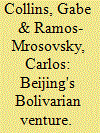

|
|
|
|
|
| Publication |
2006.
|
| Summary/Abstract |
China's growing involvement in Venezuela is a direct threat to U.S. security. Why trouble is brewing in our own backyard.
|
|
|
|
|
|
|
|
|
|
|
|
|
|
|
|
| 7 |
ID:
171307
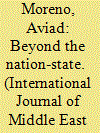

|
|
|
|
|
| Summary/Abstract |
The post-1948 mass migration of Jews from Arab Muslim countries to Israel is widely seen by scholars as a direct result of decolonization and rising nationalism across the Middle East and North Africa, coupled with the emigration and immigration policies of regional powers. In this article I draw on local histories of northern Morocco to critique the existing literature. I apply new methods to reconceptualize that migratory experience as shaped by social and cultural processes, albeit ones that interacted with nationalist state policies. I provide a multilayered macro- and microanalysis of the process of Jewish emigration from northern Morocco and point to the transregional, interpersonal, communal, and institutional networks that jointly shaped the dynamic character and pace of migration to Israel (and to Europe and the Americas) among local Jews.
|
|
|
|
|
|
|
|
|
|
|
|
|
|
|
|
| 8 |
ID:
079689
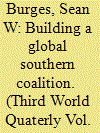

|
|
|
|
|
| Publication |
2007.
|
| Summary/Abstract |
This paper will set out the two very different regional leadership strategies being pursued by Brazil and Venezuela, concluding that it is the Brazilian neo-structuralist vision that will have more success than the Venezuelan overseas development aid approach. The two different approaches to Latin American leadership point to a substantive difference in how the regional system should operate in geopolitical and geo-economic terms, with the Brazilians favouring a market-oriented system in opposition to Venezuela's statist option. Contestation for regional leadership as set out in the article emerges as an early indicator of a chilling of relations between Brazil and Venezuela and points to a future scenario where other regional states may be able to play off contending would-be leaders.
|
|
|
|
|
|
|
|
|
|
|
|
|
|
|
|
| 9 |
ID:
093123


|
|
|
| 10 |
ID:
104682
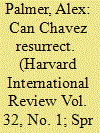

|
|
|
| 11 |
ID:
117709
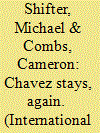

|
|
|
|
|
| Publication |
2012.
|
| Summary/Abstract |
Venezuelan President Hugo Chávez fended off a spirited challenge by Governor Henrique Capriles this fall. But continuing questions about Chavez's health and the country's dismal governance suggest that change may be coming soon. Looking ahead, the opposition will need to address concerns by the very poor that social spending will dry up if Chávez is no longer in office. Meanwhile, political differences and power struggles, and a sense of demoralization, risk undermining Capriles' diverse coalition. The regional scenario would look very different without Chávez. External players should restrain from meddling during this period of uncertainty. Instead, support should focus on trying to ensure that Venezuelans continue to rely on the ballot box in determining the course of a country facing so many daunting problems.
|
|
|
|
|
|
|
|
|
|
|
|
|
|
|
|
| 12 |
ID:
067805
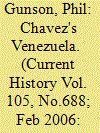

|
|
|
| 13 |
ID:
180766
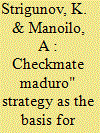

|
|
|
|
|
| Summary/Abstract |
IN A previous article,1 we wrote that Venezuelan and possibly Cuban security services might have successfully thwarted Operation Gideon thanks to an information leak from the entourage of Juan Guaidó. On May 3, 2020, Venezuelan troops, security services, and civilians prevented a coup attempt by Venezuelan deserters and American mercenaries hired by the private military company Silvercorp USA, owned by Jordan Goudreau, who incidentally did not take part in that terrorist attack. Two American terrorist mercenaries, Luke Denman and Airan Berry, and at least 47 Venezuelan deserters were taken prisoner. We surmised at that time that the Venezuelan authorities had been tipped off about Operation Gideon by Cuban intelligence agents in the United States, mainly in Florida, where there are comparatively large Cuban and other Latin American immigrant communities. Guaidó had visited Florida accompanied by supporters, who might have a leaked the Operation Gideon plan either accidentally or deliberately, as there might have been people in Guaidó's entourage who had been recruited as agents by Caracas and/or Havana.
|
|
|
|
|
|
|
|
|
|
|
|
|
|
|
|
| 14 |
ID:
119261
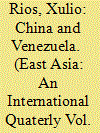

|
|
|
|
|
| Publication |
2013.
|
| Summary/Abstract |
The relationship between China and Venezuela has experienced a comprehensive and rapid development in recent years, both economically and politically and in other areas. The establishment of a "strategic partnership" between the two countries in 2001 has defined a stable framework for collaboration. China and Venezuela established diplomatic relations in June 1974 but it was with the start of the presidency of Hugo Chavez (1998) when relations intensified dramatically. In that recognized and open impulse, that Caracas defined as a "perfect match," it should be noted, however, some important reservations.
|
|
|
|
|
|
|
|
|
|
|
|
|
|
|
|
| 15 |
ID:
119258
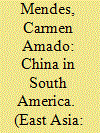

|
|
|
|
|
| Publication |
2013.
|
| Summary/Abstract |
The growing presence of the People's Republic of China (PRC) in South America highlights its domestic priorities. On the economic side, high levels of development, source of political stability and international recognition, exacerbate the need of importing natural resources and exporting manufactured products. Politically, the policy of national reunification, which is also an important provider of stability drawn from nationalism, demand strengthening relations with countries in areas attracted by Taiwan, isolating the island in the international arena. Beijing is actively working to increase its political leverage and shape the agenda of international politics giving South-South cooperation a strategic dimension well beyond mutual development. This fits South American objectives, namely the ones of Brazil, Argentina and Venezuela, that aim at diversifying international partnerships and perceive China as an alternative to the traditional orientation towards Latin America, the US and Europe. Positioning itself as a stakeholder, China creates the basis for an alternative international order using persuasion. The Chinese soft power in South America may be a drop of water in a much broader strategy.
|
|
|
|
|
|
|
|
|
|
|
|
|
|
|
|
| 16 |
ID:
133474


|
|
|
|
|
| Publication |
2014.
|
| Summary/Abstract |
IT HAS BEEN THREE YEARS SINCE WHY CIVIL RESISTANCE WORKS HIT THE shelves.1 When Maria J. Stephan and I sent the final galleys into the publisher, we had no idea that the Arab Spring was about to grip the world; that the Occupy movement would reenergize the protest sector in advanced
democracies; or that countries as diverse as Turkey, Venezuela, Ukraine, Thailand, and India would be rocked by nonviolent resistance against entrenched authority, lack of economic opportunity, and corruption. While many people have cataloged the global decline in armed conflict, few have noticed that, in the meantime, the use of civil resistance has been on the rise.
|
|
|
|
|
|
|
|
|
|
|
|
|
|
|
|
| 17 |
ID:
082013
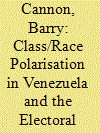

|
|
|
|
|
| Publication |
2008.
|
| Summary/Abstract |
Polls have repeatedly shown a class-based polarisation around Chavez, which some political science analysis on Venezuela has recognised. This paper seeks to show, however, that this class-based division needs to be placed in historical context to be fully understood. Examining Venezuelan history from the colonial to the contemporary era the paper shows, unlike most previous work on Bolivarian Venezuela, that race is an important subtext to this class-based support, and that there is indeed a correlation between class and race within the Venezuelan context. Furthermore, class and race are important positive elements in Chavez's discourse, in contrast to their negative use in opposition anti-Chavismo discourse. The paper briefly reviews the Chavez government's policy in tackling the class/race fissures in Venezuelan society, and concludes by asking whether these policies represent a change in the historical patterns of classism and racism within Venezuelan society or are simply reproducing past patterns
|
|
|
|
|
|
|
|
|
|
|
|
|
|
|
|
| 18 |
ID:
086088
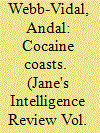

|
|
|
| 19 |
ID:
173971
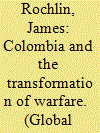

|
|
|
|
|
| Summary/Abstract |
After nearly two centuries at war with itself, Colombia witnessed an opportunity for peace in 2016 when the government reached a celebrated agreement with the leftist rebels of the Fuerzas Armadas Revolucionarias de Colombia (FARC). Three years down the road, the peace agreement has frayed, and the aura of hope that initially surrounded it has depleted. Colombia now faces a transformation of warfare marked by what appears to be an ‘end of ideology’. That is, rather than pursuing ideational goals for the achievement of a better society, the country’s diverse array of armed groups appears to be fighting primarily for the maximisation of wealth and territory. We shall begin with a conceptual discussion, and then turn to the historical context of Colombian security. This will be followed by an analysis of the elements that led to the demise of the FARC, and to the proliferation of an assortment of illegal armed groups that dot the landscape of Colombia’s transformation of war.
|
|
|
|
|
|
|
|
|
|
|
|
|
|
|
|
| 20 |
ID:
126860
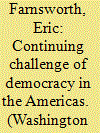

|
|
|
|
|
|
|
|